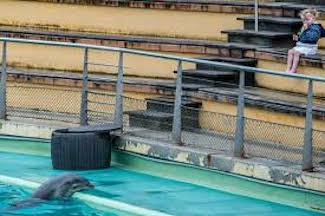We Can’t Simply Release Them, Unfortunately
This appeared on my FB timeline a few days ago, posted by a lady named Suzannah G. It’s worth taking a moment to consider her words because, as activists, and as part of a movement advocating for the safety, freedom and well-being of cetaceans, our credibility really matters.
“It frustrates me that anti captivity activists say to people ‘set them free, empty the tanks, take them back to the wild, put them back in the ocean’ etc. We have got to stop saying that!! We lose all credibility with people that defend it because they think we don’t know what we are talking about and tbh [to be honest] that’s what it sounds like. So no wonder they don’t listen and of course we need them to listen to us don’t we? We know a lot of these animals can’t simply be released, they need rehabilitation in a proper sea sanctuary. We need to start pushing/saying that instead…”
This is essentially correct, though there’s a bit to unpack here.
We’ve written on the topic before (see my colleague Anna’s post “Breaking the Bonds of Captivity” Nov 11th, 2020). Even in those cases where release back into the wild is technically possible, the process of making it happen is difficult and expensive, requiring the expertise of a number of highly knowledgeable and dedicated people. As we’ve said before, the marine park industry can take new captives far more easily than we can repair the damage from their doing so. Far, far better to prevent this injustice from happening in the first place.
Then, in a great many of these cases, release back into their natural habitat will never be a feasible option – such as for a dolphin born in captivity. The opportunity to acquire skills necessary for survival in the wild simply doesn’t exist. Even for those who got there by way of live capture, years in captivity will degrade those skills, as well as their strength, their teeth, immune systems, and their overall health. In these cases sea sanctuaries offer the best possible alternative, and we owe it to them to build many more of these. At present, we don’t have nearly enough to accommodate the approximately 3,600 held in captive facilities around the world.
That said, both fairness and compassion require us to do what we can to do right by these animals. Or at the very least, whatever can still be done for any individual from whom we’ve already taken away so much. The scope and scale of this tragedy can’t be overstated.
Now to get back to Suzannah’s (technically accurate) admonition above. We do have to be careful that we don’t come across as not knowing what we’re talking about, but I hesitate to criticize the person who responds with indignation when presented with evidence of the cruelty and exploitation of captivity, perhaps for the first time. The process of raising awareness works this way. We’ve all needed to have our attention drawn to this at one point or another, and subsequently educating ourselves on this topic takes a bit of time.
In short, I have enormous respect for anyone whose initial reaction is anger, when presented with a glimpse behind the curtain at things SeaWorld and Marineland never want them to see.
Over time, many of these people will join our colleagues in recognizing that rehabilitation and sanctuaries are essential requirements if we’re going to secure release for any of our cetacean kindred spirits. They’ll also be providing a great deal of the individual donations we’ll need to effect this.
We ourselves at CCA often use hashtags like #EmptyTheTanks in our posts or tweets, though of course we know that before that can happen, the dolphins need some place to go. The point is to reduce the numbers of butts SeaWorld can count on having in the seats at their shows. Every potential patron we take away from them is a win for us. By reducing their base, we give ourselves a much more advantageous range of options in dealing with these companies.
But yeah, in the end, Suzannah is correct that if we just say ‘empty the tanks and set them free’, we can expect that defenders of aquariums and marine parks will just laugh. How we get our point across matters. Bottom line for me? We humans just don’t have the right to deprive a being that possesses the nature and sophisticated intelligence of a dolphin of its liberty, and any argument for the perpetuation of captivity is morally indefensible. As such, we need to do what we can, not only to act with compassion, but to offer some fairness and justice to these creatures who’ve been denied it for so long.
For The Orca’s Voice,
Chris, Canadian Cetacean Alliance



Leave a Reply